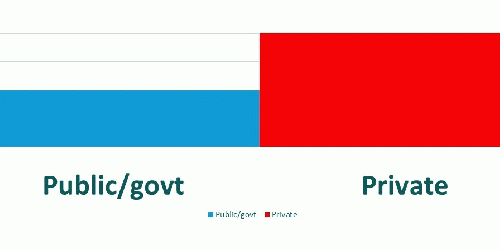
Knowing disease burden accurately is important for ending TB by 2030
(Image by CNS (Citizen News Service)) Details DMCA
(CNS): The number of TB cases in India may be up to 2-3 times higher than the latest current estimates, suggests a new research study published today in the The Lancet Infectious Diseases journal. TB is a major global public health challenge. In 2014, 6.3 million TB cases were reported worldwide, with India accounting for over 25% of them - the highest for any country.
However, the new findings illustrate that India's private sector is treating an appreciably higher number of patients for TB, than has been previously recognised. Hence, understanding the amount of TB managed by the private sector in India is crucial to understanding the true burden of the disease in the country, and thus globally.
In the absence of quality surveillance data on privately treated patients, state and national level estimates for 2013 and 2014 for the number of TB cases in India's private healthcare system were found by calculating nationwide sales of TB drugs across the private sector. The study made use of the commercial drug sales data of all 189 rifampicin containing drugs sold in India between 2013 and 2014, collected by the organisation IMS Health. All products were fixed-dose combinations and were sold only in the private sector, and not the public sector, which uses different product forms (including loose pills). Researchers estimated the treatment volume, or the total patient-months of treatment for TB in the private sector, taking into account the proportion of prescriptions for a given drug that were for TB, as well as the proportion of total drug sales.
Overall, on a national level, there was roughly twice as much TB treatment in the private sector as in the public sector. However, there are some noticeable variations between the states. At one extreme, Orissa showed the public sector having 1.5 - 2.8 times as many patient months as the private sector; while at the other extreme, the private sector in Bihar, Uttarakhand and Uttar Pradesh provided over 3 times as many patient months as the public sector in 2014.
There were 17.793 million patient-months of anti-TB treatment in the private sector in 2014 - twice that in the public sector - implying that 2.2 million TB cases were treated in the private sector in 2014 alone. This is almost 3 times higher than the latest current estimate of 800,000 TB cases escaping diagnosis by the public healthcare system in 2014.
The volume of patient treatment in the private sector, which is twice as much as that provided in the public sector, translates into an average of 1.46 million people being on TB treatment, on any given day, which is more than 0.12% of the country's population. Moreover, TB treatment in the private sector is typically paid for by out-of-pocket expenditure. If a 6-month course of first-line TB medication costs USD 20, the estimates imply that in 2014 over USD 59 million was spent in out-of-pocket expenditure on first-line TB drugs alone.
Dr Arinaminpathy, lead author of the study, warned that under-reporting could have worrying implications for the emergence of drug-resistant strains of TB. "Multi drug-resistant TB (MDR-TB) is a global worry, and the large number of cases of TB estimated in our study further fuels concerns about how we can control drug resistance. In the private sector, evidence suggests that patients are sent off with their medication without advice or support. As patients feel better within a couple of weeks they often stop taking the medication in between. However completing the course is key to effective treatment."
There is an urgent need to not only redouble efforts to address the burden of TB treated by the private sector in India, but also to improve surveillance in the private sector, as well as improve its cooperation with the public sector in India. We also need to revise current estimates of TB burden in India, and globally, informed by more systematic evidence relating to TB management in the private sector.
(Note: You can view every article as one long page if you sign up as an Advocate Member, or higher).





